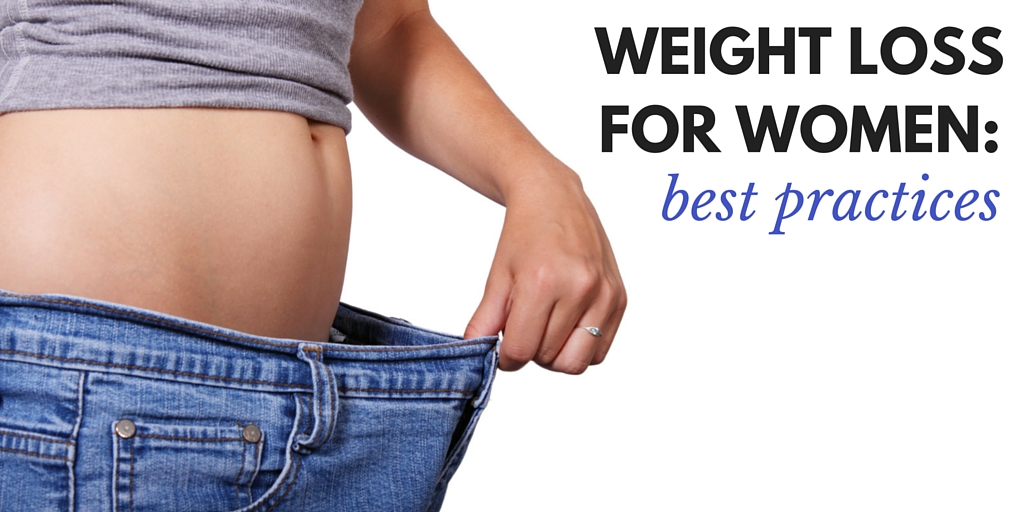Many people want to know how to lose weight fast for women, but studies show that women who lose weight gradually instead of quickly are more likely to keep the weight off. Think about a crash diet: if you’re incredibly (and I mean incredibly) disciplined, you can eat like a bird long enough to lose weight quickly, but that’s not a sustainable lifestyle. Eventually you’ll go back to your regular routine, and after the shock you put your body through, it’s actually more likely that your body will latch onto those extra calories.
However, if you slowly cut out one unhealthy item a week (for example, avoid soda week one, then starches week two, and so on and so forth), it’s a lot easier to manage. Plus, when you’re focusing on avoiding starches, you’ll realize you don’t even miss the soda.
Studies also show that you begin to see health benefits after losing just 5-10% of your body weight. That’s only 10 pounds if you’re 200 pounds. So, celebrate the small victories too! You shouldn’t aim to cut your width in half. Focus on the health benefits - how you feel.
Determine Your BMI
Try to not get caught up with numbers on a scale, because muscle actually weighs more than fat. So two people may weigh the same, but one may be slimmer, healthier, and more active.
Your body mass index (BMI) is a popular way to gauge your weight because it calculates your mass instead of your weight - two different things. You can find the formula below:
(Weight in Pounds x 703) / (Height in Inches) / (Height in Inches) = BMI
For example, if someone weighed 200 pounds and stood at 5’5’’ (65 inches), the formula would be:
(200 x 703) / 65 / 65 = 33.28
Generally speaking, BMIs of:
● 12-18 are underweight
● 19-24 are healthy
● 25-30 are overweight
● 30-39 are obese
● 40+ are dangerously obese
Your Diet
The best way to lose weight is in the kitchen and not on the track, just so you know. Some tips and tricks for keeping your diet in control are:
1. Limit your portions. You don’t have to cut out everything you love. In fact, you’re more likely to give up on the diet all together if you do. If you love pasta, make sure you only have a cup of it on the side instead of an entire dinner.
2. Avoid Hunger. Keep yourself of a schedule of healthy foods and snacks throughout the day. You’re less likely to binge on something bad if you never allow yourself to starve. Plus, if you eat small meals often instead of two or three large meals, your metabolism has more time to break everything down in a healthy way.
3. Drink water. Studies show that at least drinking one glass of water before each meal helps you to not overindulge, but you should be drinking half your body weight (in ounces) in water each day. That means someone who is 200 pounds should drink 100 ounces of water a day. Plus, many times you think you’re hungry, you’re actually just thirsty.
4. Eat slowly. It can take your stomach up to 20 minutes to tell your brain it’s full, so the faster you eat, the more unnecessary calories you’re taking in.
5. Plan your meals. You’re less likely to swing through a drive-thru if you know you have a chicken defrosting at home or produce that will go bad. Also, you spend all day at work knowing that you’re going to cook when you get home, it’s usually more fun than when you get home, hungry, and have to figure something out with what you have.
Exercise
It’s no secret that one of the best exercises to lose weight is cardio - walking, jogging, running, hiking, biking. Exercise works similarly to diet, however, in that you need to start slow. If you haven’t gone for a run in months, don’t set out to do 3 miles - you’ll end up tired, in pain, and disappointed in yourself.
Also, don’t set out to do it every day, just most days. Four out of seven days a week is a great goal. It’s just about every other day, and you’re exercising more often than not. Many people will focus on cardio to lose weight, and then once they’re at their desired weight or silhouette, they’ll focus on strength training to tone.
Invest in yourself. Get a pedometer to keep track. Get some cute workout clothes to motivate you. Make the trip to the beautiful hiking spot you heard about. It will start to feel less like work and more like “me time” if you do things you enjoy.
Written by: Joanna Hynes
